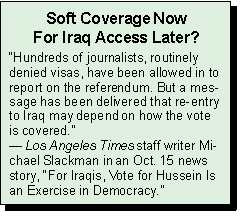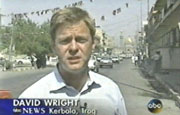 |
|||||||||
|
 |
||
|
 |
||||||||||||||||||||||||
|
||||||||||||||||||||||||
 |
||||||
|
||||||
 |
||||||
|
 |
||||||||||||||||||
|
||||||||||||||||||
 |
||||||||||||||||||||||||
|
||||||||||||||||||||||||
 |
||||||||||||||||||
|
||||||||||||||||||
|
|
|
For Immediate Release: Katie Wright (703) 683-5004 - Thursday,
October 17, 2002

ABC's Wright: It's "Impossible to Say" If 11,440,638 to Impressed by Sick Distortion of Democracy Hopefully, this week was not a sneak preview of the kind of coverage reporters have planned if the American military is called upon to remove Saddam Hussein and his cronies from their power perch in Baghdad. The broadcast networks covered the "re-election" of the Iraqi dictator with plenty of illustrations of the people's alleged support for their leader, and few hints that the whole exercise was a big fat lie. "All 11,440,638 eligible voters went to the polls with one thought: Yes to Saddam Hussein!," NBC's Keith Miller asserted on Wednesday's Today. "The government proclaimed it a victory of light over darkness, good over evil. It seemed more like a political miracle."
None of the Baghdad correspondents embraced the fraud, but most couldn't say it was a fraud, either. Instead, viewers were given understated hints that, even as Iraqis were forced to mechanistically pledge their support for another seven years of Saddam, the whole exercise was, in fact, hollow. One exception: CBS's Tom Fenton put the "election" in proper context on Tuesday's
Evening News: "It's no surprise everyone seemed to be voting 'yes.' You would be foolish not to; a UN human rights report said 500 people were jailed in the last referendum after casting a negative ballot."
Wright showed an Iraqi man who insisted individual voters really could reject Saddam. "When the last referendum took place, Saddam Hussein won 99.96 percent of the vote," Wright noted, adding "it is impossible to say whether that's a true measure of the Iraqi people's feelings." So in his mind such orchestrated unanimity could possibly be a "true measure" of Iraqi opinion? During the 1991 Gulf War, network reporters similarly presented the tightly-controlled statements of unfree people as genuine opinions. An MRC study found 94 percent of comments from Iraqis shown on ABC, CBS and NBC in February 1991 were pro-Saddam. There were absolutely no anti-Saddam soundbites; the other six percent were ambiguous. Pretending that the Iraqi public was pro-Saddam was preposterous, but that was the sum and substance of TV's on site reporting from Baghdad. Only after the war was over did reporters reveal the Iraqi people's true opinions. "The one thing people have to know is that this man, privately, Saddam Hussein, is a hated man," Betsy Aaron told Dan Rather on the March 7, 1991 Evening News. But Aaron showed no anti-Saddam opinions in her dispatches from Iraq. As this week's coverage suggests, accurate reporting may again have to wait until a new war is concluded, and access-hungry reporters don't have to impress Saddam with their "fairness." -- Rich Noyes
Home | News Division
| Bozell Columns | CyberAlerts |







 "On the streets it was like Saddam won the mother of all elections. The celebrations were genuine, but already the validity of the vote is being questioned," Miller added. He called it "unbelievable" - but put doubts in the mouths of others. "The Bush administration dismissed the vote as not credible," Miller conveyed, carefully preserving his neutrality (see box). He also passed along the spin that the "vote" was a repudiation of Bush: "Pollsters show that the Iraqi people reject President Bush's demand for a regime change."
"On the streets it was like Saddam won the mother of all elections. The celebrations were genuine, but already the validity of the vote is being questioned," Miller added. He called it "unbelievable" - but put doubts in the mouths of others. "The Bush administration dismissed the vote as not credible," Miller conveyed, carefully preserving his neutrality (see box). He also passed along the spin that the "vote" was a repudiation of Bush: "Pollsters show that the Iraqi people reject President Bush's demand for a regime change."
